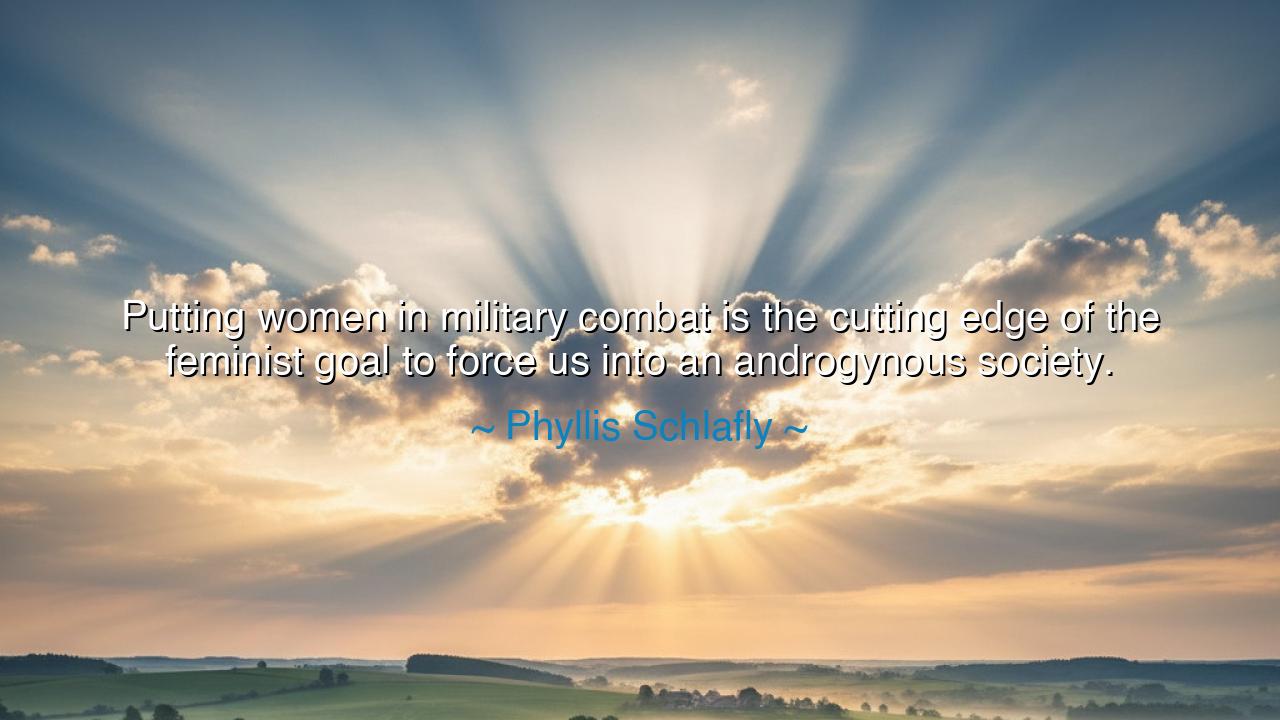
Putting women in military combat is the cutting edge of the
Putting women in military combat is the cutting edge of the feminist goal to force us into an androgynous society.






Hear the voice of Phyllis Schlafly, a woman fierce in conviction, who once declared: “Putting women in military combat is the cutting edge of the feminist goal to force us into an androgynous society.” These words, sharp as a blade, reveal not only her stance in the great debates of her age, but also the eternal struggle between tradition and transformation. For in her warning lies the fear of losing distinction between man and woman, of dissolving ancient roles in the fire of modern equality.
To her, the military combat field was the last fortress of masculine identity, a place where strength, sacrifice, and protection were tied to manhood itself. To place women there was not simply to grant them opportunity, but to challenge the very structure of society. For Schlafly, the rise of the feminist cause was not only about political rights, but about reshaping the soul of civilization. The androgynous society, as she saw it, was one where the unique roles of the sexes would vanish, and in that vanishing, society would lose its order.
History shows us that such fears are not new. In ancient Sparta, women were trained in strength and discipline, not for war itself, but so they might bear warriors and uphold the state. Their power unsettled other Greeks, who believed that giving women such space would upset the natural order. Yet Sparta endured for centuries, and its women were respected in ways foreign to Athens. The struggle between distinction and equality, between tradition and change, has thus echoed through every age. Schlafly’s words stand within this unending debate.
Her warning also touches upon the deeper question: what is the essence of society? Is it the preservation of roles long held, or the freedom to redefine them? For some, the blurring of distinctions threatens identity, as if manhood and womanhood lose their meaning when both share the battlefield. For others, the opening of every role to both sexes is the truest form of justice, and the androgynous society is not a curse but a liberation. These two visions clash, as waves against cliffs, shaping the coastline of our civilization.
Consider the more recent tale of women in the armed forces of nations such as Israel. There, necessity demanded that women fight alongside men. Far from destroying society, it gave rise to a new vision of citizenship, where duty and sacrifice were shared. Yet it also stirred unease, as questions of identity, tradition, and gender roles rose again. Thus, Schlafly’s words, though rooted in her time, remain part of a dialogue that continues to shape nations: can equality and difference coexist, or must one be sacrificed for the other?
The lesson here is not merely about women and war, but about the balance of change and continuity. Every society must ask: which roles are sacred, and which can be transformed? To refuse change entirely is to risk stagnation; to erase all distinction is to risk rootlessness. Wisdom lies in discerning what must endure, and what must evolve. Schlafly’s voice, though controversial, reminds us that change must be examined, not blindly embraced, for even noble causes can reshape society in ways unforeseen.
Therefore, O listener, take this teaching to heart: when confronted with the fires of change, do not fear them, nor worship them blindly. Instead, inquire deeply. Ask what is gained, and what is lost. Respect the strength of tradition, but do not be bound by it. Honor the call for equality, but do not erase the value of difference. For a society is not strengthened by extremes, but by harmony. And whether we agree with Schlafly or not, her warning challenges us to hold the mirror close and ask: What kind of world are we building, and at what cost?
Thus, remember: the debate over women in military combat, the feminist movement, and the vision of an androgynous society is not simply about battles fought with weapons, but about the eternal battle over the soul of humanity. May we be wise, courageous, and discerning in the choices we make, so that the future we build honors both freedom and truth.






AAdministratorAdministrator
Welcome, honored guests. Please leave a comment, we will respond soon